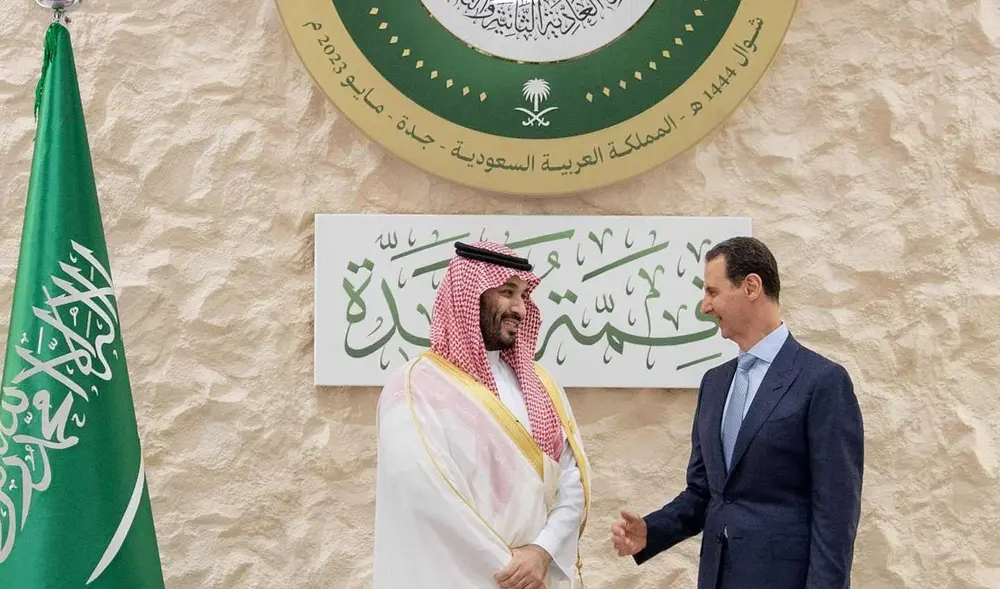Syria's Return to the Arab League: Exploring the Voluntary Safe Return and the Fate of Syrian Refugees

On 7th May 2023, the approval of Syria's return to the Arab League came into effect following intensive meetings and in-depth discussions about the Syrian crisis. An extraordinary meeting of foreign ministers from the Arab League countries resulted in a unanimous decision to resume Syrian participation. As the Arab League Secretary-General stated in his press conference following the decision, "Syria's return to its vacant seat in the League of Arab States is the beginning of the resolution movement, and not the end of the settlement." This is parallel with the establishment of a liaison committee of five Arab countries to follow up on the process of communication with the Syrian authority in efforts to get the state out of its crisis (Cafiero & Milliken, 2023).
It is noteworthy to mention that the membership of Syria in the Arab League was revoked subsequent to President Bashar al-Assad's decision in March 2011 to suppress protests, which led to the eruption of a civil war causing the loss of nearly half a million lives and the displacement of approximately 23 million individuals. With the recent decision to accept Syria back into the Arab League, it is necessary to now discuss the challenges and prospects of voluntary safe return for Syrian refugees, and shed light on the complex situation and consequences faced by displaced Syrians.
A Return to the Arab League: Defrosting After 12 Years
Following a suspension that lasted over ten years, the Arab Foreign Ministers Council has made the decision to reinstate the Syrian regime's position in the Arab League, which had remained vacant since November 2011. Subsequently, the Kingdom of Saudi Arabia extended an invitation to President Bashar al-Assad, inviting him to attend the 32nd Arab Summit held in Jeddah, Saudi Arabia on May 19, 2023, where he represented the Syrian Arab Republic. This development signifies the end of the Assad regime's isolation within the Arab sphere (Lewis & El Safty, 2023). However, it is important to note that the circumstances and reasons that initially led to Syria's membership suspension have not undergone any notable changes. Additionally, there are no specific guarantees regarding the fate of refugees, disclosure of prisoners' status, or progress in the stagnant political process aimed at addressing the crisis. Both the Arab League and Western nations have consistently emphasized the necessity of meeting these conditions for any potential rapprochement with the Syrian regime. Which raises the question, what lead to the re-admission of Syria in the Arab league if the resolution conditions are not met yet?
The Flow of Captagon Drugs to the Region: One significant factor is the concern over the flow of Captagon drugs within the region. Arab countries, especially Jordan, the Gulf states, and Saudi Arabia, have been particularly focused on addressing the issue of drug trafficking from Syria (Lewis & El Safty, 2023). Captagon, a highly addictive amphetamine drug produced in Syria, has found its way into the Gulf countries, known for their oil wealth. Lewis and El Safety (2023) indicate a surge in demand for Captagon in Saudi Arabia, leading to the country being labeled as the capital of drug consumption in the Middle East. The Saudi government is apprehensive that these drugs could be used to bolster militias and groups hostile to their interests in Syria and potentially fund the Syrian regime (Gregory, 2022). Consequently, some experts suggest that the visible motivation for Syria's invitation to rejoin the Arab League is primarily linked to the need to address the flow of drugs from Syria to other Arab nations (Schaer, 2023).
Iran and Saudi Arabia Bi-lateral Agreement: According to the International Crisis Group (2023), the recent rapprochement between Iran and Saudi Arabia is perceived to have potential implications on the security concerns of Gulf Arab states. Hence, this development becomes particularly relevant in light of the recent Arab League meeting where Syria's rejoining was discussed. On 10th March, Saudi Arabia and Iran reached an agreement to restore diplomatic relations, facilitated by a Chinese-sponsored initiative aimed at reducing tensions in the Middle East (International Crisis Group, 2023). Both Iran and Saudi Arabia play active roles in the Syrian crisis as the regime is backed by Iran and the rebel forces by Saudia Arabia. However, the new agreement between the two countries has improved their bi-lateral relationship and has had a positive impact on the Arab region. Experts see that the agreement has produced friendly dialogue between the two differing countries which has created an environment where a consensus could be decided on the matter of Syria’s return to the Arab League.
The role of China: In the Iran and Saudi Arabia Agreement, China's role in the Middle East has been evident. China's policy approach has evolved from a primarily economic focus, centered on foreign direct investment (FDI) and regional economic engagement, to encompass greater political involvement (Lons et al., 2019; Scobell et al., 2018). According to Operations and Policy Center (2021), China is emerging as a key player with its economic initiatives in rebuilding Syria as part of its Belt and Road Initiative (BRI). The ongoing conflict in Syria has increased the need for infrastructure which Beijing may be poised to invest in. With damaging Western sanctions in place and little financial and expertise competition from Iran or Russia, China has an unprecedented ingress into Syria's economy. Following Syria's return to the Arab League, China has expressed its support and welcomed this development. The Chinese Foreign Ministry in a Regular Press Conference on 8th May 2023, said that China believes "Syria's reintegration strengthens solidarity and self-improvement among Arab states" (China Foreign Ministry, 2023). This raises an important question regarding China's potential future role in Syria and the region. Given the prevalent discourse surrounding the rebuilding of Syria, it remains to be seen if China will actively participate in these endeavors and contribute to the rebuilding process.
The voluntary “Safe” return of Syrians:
With Syria now allowed as an active member of the Arab League again, the discussion around refugee returns has emerged. The topic of voluntary return has gained significant attention and prominence in recent weeks, with notable politicians and parties in the Turkish presidential campaign actively discussing it. Due to Turkey's substantial population of Syrian refugees, all political parties in the country strategically employed the concept of voluntary return as a key electoral issue during the recent election (BBC, 2023).
A comprehensive understanding of "Voluntary Return" involves an individual's decision to move from a host country to their country of origin, nationality, or habitual residence. This return, which can be facilitated or spontaneous, occurs after a substantial period spent in the host country (European Commission, 2023).The latest UNHCR survey reported that most Syrian refugees in Jordan, Lebanon, Iraq and Egypt still hope to return home one day, with a large number hoping to return within five years, and a small portion hoping to return within the next 12 months (News. UN, 2023). Despite that, organizations show concern in volunteer return at this time. During October 2021, Human Rights Watch conducted a comprehensive investigation, revealing distressing findings regarding the situation of Syrian refugees who chose to return to their home country between 2017 and 2021 from Lebanon and Jordan. The report documented instances of severe human rights violations and persecution perpetrated by the Syrian government and affiliated militias. These findings serve as strong evidence indicating that Syria remains an unsafe and precarious environment for individuals contemplating their return (Human Rights Watch, 2021). Experts pose questions regarding the response of the United States who says it will not normalize relations with Syria and would not change its opposition to al-Assad without an inclusive political settlement to the conflict (Al-Jazeera, 2023). European countries, particularly those that have received a significant number of Syrian refugees, such as Germany, are cautious about engaging in "unconditional normalization" with Syria, The German foreign minister emphasized the importance of not normalizing relations with the Syrian regime without first addressing the conflict and managing the refugee situation. She emphasized that any progress towards resolving the conflict should be contingent upon tangible concessions. Furthermore, she expressed her belief that Assad should not be rewarded for ongoing and grave human rights violations. (DW, 2023). However, there has been no explicit political discourse regarding the topic of refugee returns. The platform "Return and Reintegration in Germany" acknowledges the prevailing security concerns in Syria, which have influenced the decision not to support assisted voluntary returns to the country. The platform emphasizes that this decision is based on recognizing the ongoing challenges and risks faced by individuals considering a return. It further states that the federal government, federal states, and the International Organization for Migration (IOM) are closely monitoring and evaluating the situation to ensure that responses can be adapted to align with the current developments (Returning from Germany, 2023).
Given the complex dynamics surrounding the return of Syrian refugees and the recent development of Syria rejoining the Arab League, it is imperative to examine the potential implications for the displaced Syrians in various countries. The prospect of Syria's reintegration into the Arab League raises questions about the future of Syrian refugees and their legal status, access to rights and services, and the international community's responsibility in supporting their repatriation or providing alternative solutions. Further comprehensive research and analysis are crucial to gain insights into the multifaceted challenges and possibilities that may arise for Syrian refugees in light of Syria's renewed engagement with the Arab League.
References
Al-Jazeera. (2023, May 5). US says it will not normalise relations with Syria’s Assad. AL JAZEERA NEWS. www.aljazeera.com/news/2023/5/5/us-says-it-will-not-normalise-relations-with-syrias-assad
Cafiero, G., & Milliken, E. (2023, May 19). Analysis: How important is Syria’s return to the Arab League? AL JAZEERA. www.aljazeera.com/news/2023/5/19/analysis-how-important-is-syrias-return-to-the-arab-league
China Foreign Ministry, R. P. C. (2023, May 8). China congratulates Syria on rejoining Arab League. www.fmprc.gov.cn/eng/xwfw_665399/s2510_665401/2511_665403/202305/t20230508_11073476.html
DW. (2023, May 15). Baerbock warns against “unconditional” Assad normalization. Deutsche Welle. www.dw.com/en/baerbock-warns-against-unconditional-assad-normalization/a-65631264
Gregory, A. (2022, September 22). The Captagon Problem in Saudi Arabia and Other Gulf States. Arab Center Washington DC. arabcenterdc.org/resource/the-captagon-problem-in-saudi-arabia-and-other-gulf-states/
Human Rights Watch. (2021, October 20). Syria: Returning Refugees Face Grave Abuse. Struggle to Survive Amid Devastation, Property Destruction. www.hrw.org/news/2021/10/20/syria-returning-refugees-face-grave-abuse
International Crisis Group. (2023, April 19). The Impact of the Saudi-Iranian Rapprochement on Middle East Conflicts. www.crisisgroup.org/middle-east-north-africa/gulf-and-arabian-peninsula/iran-saudi-arabia/impact-saudi-iranian
Lewis, A., & El Safty, S. (2023, May 8). Arab League readmits Syria as relations with Assad normalise. Reuters. www.reuters.com/world/middle-east/arab-league-set-readmit-syria-relations-with-assad-normalise-2023-05-07/
Lons, C., Fulton, J., Degang, S., & Al-Tamimi, N. (2019, October 21). China’s great game in the Middle East [The European Council on Foreign Relations]. ecfr.eu/publication/china_great_game_middle_east/
News. UN. (2023, May 30). The United Nations: The renewed diplomatic activity is an opportunity for a political solution in Syria. news.un.org/ar/story/2023/05/1120682
Operations and Policy Center. (2021, March 24). The Red Dragon in the Land of Jasmine: An Overview of China’s Role in the Syrian Conflict. opc.center/an-overview-of-chinas-role-in-the-syrian-conflict/
Returning from Germany. (2023). Return and Reintegration in Germany, Syria, Arab Republic [Data set]. www.returningfromgermany.de/en/countries/syria/
Schaer, C. (2023, May 9). Syria returns to Arab League: What will it change? DW. www.dw.com/en/syria-returns-to-arab-league-what-will-it-change/a-65561532
Scobell, A., Summers, T., Shichor, Y., Hsu, S., Foley, S., Gater-Smith, P., Evron, Y., Yu, W., Burton, G., & Calabrese, J. (2018). China’s presence in the Middle East: The implications of the One Belt, One Road Initiative (A. Ehteshami & N. Horesh, Eds.). Routledge, Taylor & Francis Group.
About the Author

Fouad Leboukh, currently pursuing an MPP degree at the Willy Brandt School of Public Policy, specializes in peace and conflict studies and the management of non-profit organizations. His research primarily focuses on energy geopolitics, but he also demonstrates a deep passion for international relation, refugee and diaspora studies. Prior to joining the Willy Brandt School, Fouad gained valuable experience as a consultant for civil society organizations in Algeria and worked in communications with local and international organizations.
~ The views represented in this blog post do not necessarily represent those of the Brandt School. ~